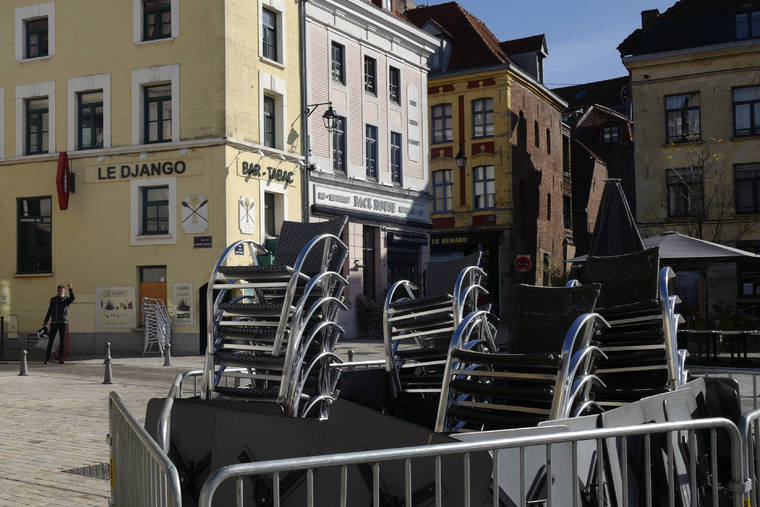PARIS — Four French cities have joined Paris and Marseille in the maximum alert status to fight the spread of the coronavirus, and it appeared likely that the list would soon grow as infections soar.
Bars shut down and other severe measures are ordered under maximum alert.
Lyon, Grenoble and Saint-Etienne in the southeast and Lille in the north moved to maximum alert on Saturday when health authorities reported nearly 26,900 new daily infections in 24 hours. There were just under 5,000 new hospitalizations over the past week, with 928 of them in ICUs, and the positive rate for the increasing number of COVID-19 tests climbed to 11%. Nearly 32,690 coronavirus deaths have been counted in France, but the actual number is likely higher due to deaths at home and incomplete reporting from hospitals or rest homes.
While France girded itself for a climb in critical numbers, a consultation by the National Order of Nurses published Sunday suggested that a significant number feel tired and fed up, with 37% saying that the coronavirus pandemic is making them want to change jobs.
Nearly 59,400 nurses responded to the Oct. 2-7 internal survey on the impact of the health crisis on their working conditions, out of 350,000 in the Order of Nurses. A spokesman for the order, Adrien de Casabianca, described the survey as a “consultation” without the classic methodology of a poll.
The numbers painted a grim diagnosis of the profession and suggested that French medical facilities may not be keeping pace with the growing need, despite lessons that should have been learned from the height of the virus crisis last spring.
Of nurses in public establishments, 43% feel that “we are not better prepared collectively to respond to a new wave of infections,” according to the survey. The figure rises to 46% for nurses in the private domain. And about two-thirds of respondents say their working conditions have deteriorated since the start of the crisis.
Burnout looms, the survey shows, with 57% of respondents saying they have been professionally exhausted since the start of pandemic, while nearly half saying there’s a strong risk that fatigue will impact the quality of care patients receive.
For 37% of the nurses responding, “the crisis … makes them want to change jobs,” and 43% “don’t know if they will still be nurses in five years,” according to the survey.
The National Order of Nurses notes that 34,000 nurses’ jobs in France are currently vacant.
Nurses and other health professionals in France and elsewhere have sporadically demonstrated for higher salaries, better working conditions and more personnel, even during the pandemic. They were given small salary hikes in France starting this fall.
“Today, nurses must deal with a growth in COVID-19 cases and feel unarmed to do so,” the president of the National Order of Nurses, Patrick Chamboredon, said in a statement accompanying the survey.
With nurses “indispensable” to the functioning of the health system, “we cannot accept that,” he said.
The head of the infectious diseases unit at Paris’ Bichat Hospital, a major COVID-19 treatment center, Yazdan Yazdanpaneh, questioned whether so many nurses really want to change jobs because “despite it all, these are people who adore their work.”
“They are tired … it’s stress, it’s tension, it’s lots of work,” he said on BFMTV. “Truly, we must take care of them.”
———
Follow AP coverage of the virus outbreak at http://apnews.com/VirusOutbreak and https://apnews.com/UnderstandingtheOutbreak
———
This story has been corrected to show the National Order of Nurses published an internal survey, not a poll.


